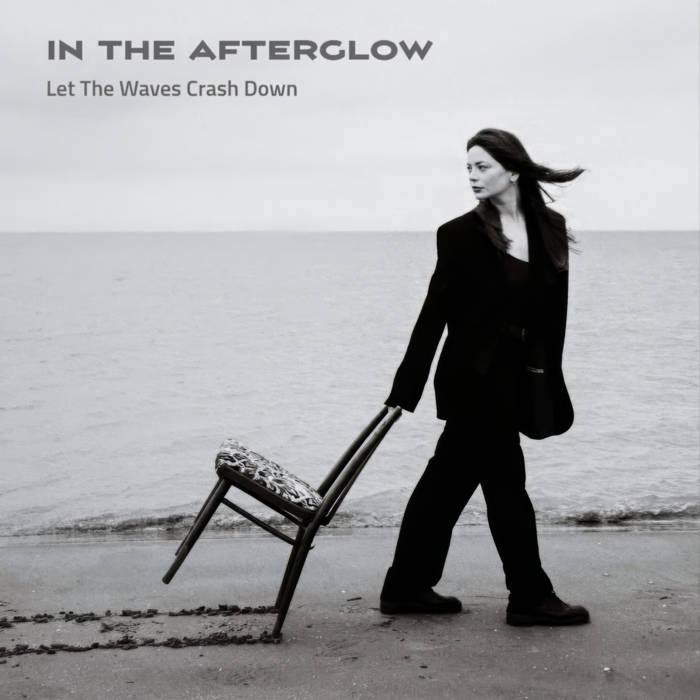In The Afterglow — Let The Waves Crash Down
Released October 24, 2025 – Vancouver, British Columbia
Genre: Dream Pop / Indie / Shoegaze
Vancouver’s In The Afterglow is not just another entry in the world of dream pop and shoegaze — it represents a quiet revolution. The project, created by British-Canadian producer Alfred Hermida, stands at the crossroads between human intuition and artificial intelligence, crafting songs that shimmer with emotion while hinting at the digital age that helped shape them.
With Let The Waves Crash Down, Hermida delivers an album that captures both the timeless ache of shoegaze and the endless curiosity of modern technology. Working between his home studio and the virtual realm, he uses Udio Beta AI as a collaborator rather than a tool — feeding it thematic direction, lyrical fragments, and stylistic cues. The AI generates initial ideas, harmonies, and textures, which Hermida then reshapes, refines, and humanizes. The result is music that feels at once deeply personal and slightly alien — as if it’s drifting in from a dream, or an alternate emotional frequency.
A fusion of memory and machinery
The album’s title, Let The Waves Crash Down, is a fitting metaphor for its sound: vast, fluid, and immersive. The waves are emotional and sonic alike — swells of reverb-soaked guitars, synths that pulse like ocean currents, and vocals that rise and fall like tides. Hermida doesn’t hide behind walls of sound; instead, he lets them breathe. Each track unfolds patiently, rewarding listeners who give themselves over to its hypnotic textures.
The sound design is strikingly rich yet uncluttered. Layers of gauzy guitars and spectral synths wrap around distant, melancholic vocals that feel like echoes of memory. The beats move like tides, sometimes barely there, sometimes crashing forward with cinematic force. This interplay of texture and restraint gives the album a rare emotional balance — equally delicate and powerful.
Themes of distance, reflection, and renewal
Lyrically and tonally, the album explores the liminal spaces between loss and rebirth, between vulnerability and strength. Hermida’s writing often circles around the tension of holding on and letting go — of love, of certainty, of self. There’s an undercurrent of longing throughout the record, but it’s not despairing; rather, it’s reflective, as if each song represents a fragment of acceptance within the larger flow of life.
It’s music that feels cinematic in scope yet deeply interior — the kind of soundscape that makes you feel alone, but beautifully so. The emotional atmosphere recalls the early works of Slowdive and Cocteau Twins, but Hermida adds his own layer of futuristic melancholy, hinting at Radiohead’s digital introspection or Beach House’s weightless romanticism.
The sound of a new creative frontier
By integrating AI into his creative process, Hermida isn’t chasing novelty — he’s exploring what collaboration can mean in the modern age. The partnership between algorithmic generation and human emotion doesn’t dilute the soul of the music; it amplifies it. The machine provides structure and suggestion, but it’s Hermida’s sensitivity that gives it pulse, shape, and humanity. The result is a new kind of dream pop — one that acknowledges the role of technology not as intruder, but as instrument.
Why Let The Waves Crash Down stands out
What makes In The Afterglow so compelling is how effortlessly it bridges eras. There’s a nostalgic familiarity to its sound — the gauzy guitars, the underwater vocals, the luminous melancholy — but the execution feels entirely modern, even futuristic. Hermida manages to retain shoegaze’s romantic heart while expanding its possibilities.
At a time when AI in music often provokes skepticism or fear, Let The Waves Crash Down offers a different perspective: one of partnership, curiosity, and artistic courage. It’s an album about emotion in an age of algorithms, about the human need to find warmth inside the digital glow.
Ultimately, Let The Waves Crash Down feels like an act of surrender — to sound, to feeling, to the uncertain beauty of creation itself. The waves Hermida speaks of don’t just crash; they carry you somewhere else entirely.
Lush, introspective, and quietly groundbreaking, “Let The Waves Crash Down” proves that in the hands of a sensitive artist, even artificial intelligence can sound heartbreakingly human.
© Thusblog







